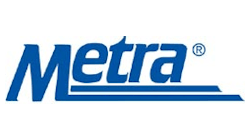Metra has reached an agreement with business and civic groups in Lake County to share the costs of a potential two-year pilot project for two new reverse-commute trains on the Milwaukee District North Line and to work on a definitive agreement to share the cost of installing a universal crossover near Lake Forest, which would create additional opportunities for enhanced service.
The public-private partnership agreement, which must be approved by the Metra Board of Directors, is the culmination of a process that began with an appearance by Lake County officials at a Metra Board meeting in April. The officials asked Metra to explore ways to improve reverse-commute service to Lake County in order for them to effectively recruit and retain employees living in Chicago. They also argued that better train service would reduce pollution and roadway congestion and improve employee productivity and satisfaction.
After several months of discussion, Metra and Lake County Partners, an economic development corporation affiliated with Lake County businesses and government, agreed to a public-private partnership that would work together to investigate the viability of increased service. The groups will evenly split the $1.4 million cost of operating one new reverse-commute train in each rush period as part of a two-year demonstration project and work on a definitive agreement to divide the $4.75 million cost of installing a crossover near Lake Forest, with the partners contributing $2.75 million, Metra contributing $1 million and local governments contributing $1 million.
“At a time when Metra is pinched for operating and capital funding, this partnership is an innovative way to test the demand for service to Lake County and potentially improve our infrastructure,” said Metra CEO/Executive Director Jim Derwinski. “We are hopeful that this initiative will build our ridership, help local businesses to recruit top talent and have a positive impact on economic activity in Lake County.”
“We hope this is a successful model for dealing with funding challenges going forward,” said Metra Chairman Norman Carlson.
“This project makes it even easier to live in Chicago and work in Lake County. Thanks to the hard work and support of so many local leaders, this unique partnership will give our business community even greater access to workforce talent,” noted Lake County Partners President and CEO Kevin Considine.
Metra’s current schedule is not ideal for reverse-commute riders to and from Lake Forest, the station closest to several major employers including AbbVie, Horizon Pharma and others. There are no morning outbound express trains, and the afternoon trains are either too early or too late for most workers.
Changes to the current schedule were not possible until recently, when Metra upgraded the signal system on the line, creating more flexibility. Under the proposal, Metra would add new outbound express Train 2191, departing Union Station at 5:35 a.m. and arriving in Lake Forest at 6:25 a.m. It would change the schedule of one inbound afternoon train (2146) to create express service from Lake County and would add new inbound Train 2194, departing from Lake Forest at 5:30 p.m. and arriving at Union Station at 6:22 p.m. The schedule of Train 2148, which now arrives at Union Station at 6:11 p.m., would be pushed back three minutes. The new schedule would start in January.
There would also be a few other schedule adjustments to help relieve crowding or to better reflect actual operating conditions:
- A new Train 2192 will depart Lake Forest at 7:48 a.m., making stops at Lake Cook Road, North Glenview, Golf, Edgebrook and Western before arriving at Union Station at 8:40 a.m. That should relieve crowding on Train 2120, which will now make fewer stops and have a slightly adjusted schedule, and Train 2122.
- A new Train 2193 will leave Union Station at 3:20 p.m., serving Western, Healy, Morton Grove, Glenview, North Glenview, Northbrook, Lake Cook, Deerfield and Lake Forest. That will fill a gap in service on the current schedule.
- Later evening Trains 2154 and 2160, and North Central Service Train 120 (which uses the Milwaukee North tracks) will have their departure times shifted back by 5 to 8 minutes.
- Outbound rush hour Trains 2145 and 2147, which now depart Union Station at 5:58 p.m. and 6:19 p.m., would now depart at 6:05 p.m. and 6:25 p.m.
If the pilot project shows that there is a strong market for reverse-commute service and that the service is self-sustaining, the partners agree to enter into an agreement to fund the construction of a new crossover near the Lake Forest Station. A crossover allows trains to switch between tracks. Constructing a crossover at Lake Forest would allow Metra to turn trains around at that location, which would create an opportunity for better service in the morning and evening rush periods if demand supported it.


